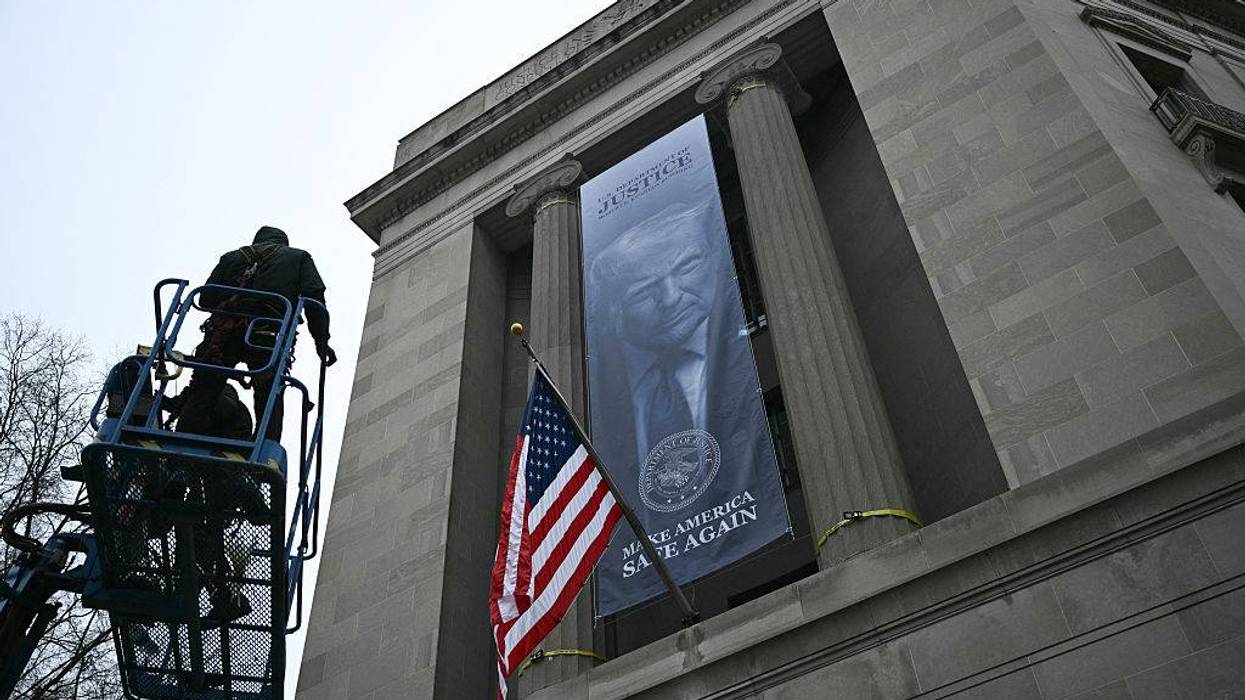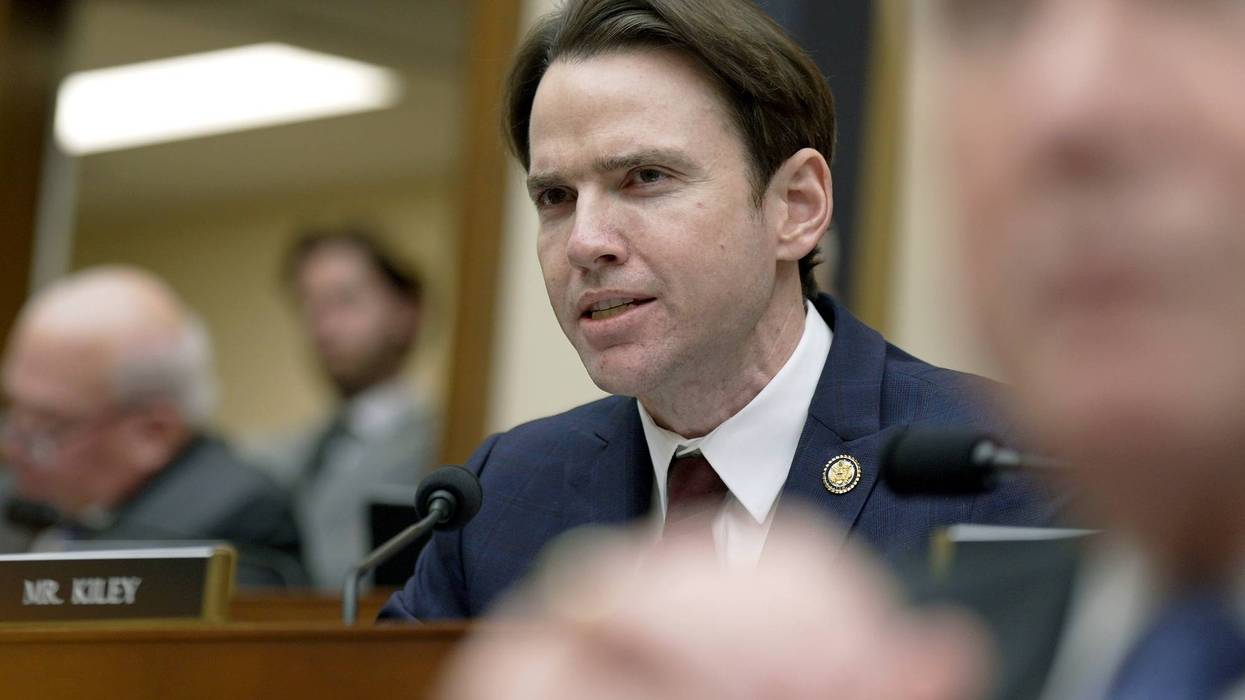Note: On July 25, U.S. Reps. Chris Van Hollen (D-Md.) and David Price (D-N.C.) submitted an amicus curiae, or "friend-of-the-court," brief to the U.S. Supreme Court in defense of the Federal Election Commission in this case. Public Citizen Attorney Scott Nelson and former U.S. Solicitor General Seth Waxman are leading their team of attorneys.
McCutcheon v. Federal Election Commission (FEC), a case whose impact on our political system could be as damaging as Citizens United, is headed for the U.S. Supreme Court this fall, and it could dramatically boost the corrupting influence of the wealthy over candidates in federal elections.
In the case, the justices will consider whether to eliminate the limit on the total sum that people can give directly to candidates and political parties in a single election. The current overall limit for an individual making direct contributions to parties, political action committees (PACs) and federal candidates is $123,200 per two-year election cycle, but a win for the challengers in McCutcheon could allow total contributions above $7 million.
The case is being heard just a few years after the highly controversial Citizens United v. Federal Election Commission, in which the court gave corporations the green light to spend unlimited sums to influence elections. That decision, the biggest game-changer to date in a long-term effort by corporate interests to kill campaign finance laws, led to unprecedented spending by the wealthy and corporations in the 2010 midterm congressional elections and last year's presidential elections. It also sparked a robust movement, led in part by Public Citizen, for a constitutional amendment to overturn the decision. Depending on how the justices rule, McCutcheon could be the next game-changer.
The McCutcheon suit was brought by Alabama businessman Shaun McCutcheon and the Republican National Committee (RNC). In challenging the current law, McCutcheon says he made direct contributions to 16 federal candidates in recent elections and wanted to give the same amounts to 12 more. Those additional contributions would have put him over the aggregate limit for candidate contributions in an election cycle, which in 2012 was $46,200 to federal candidates, made up of individual contributions of no more than $2,600 (or $5,200 in a two-year election cycle comprising a primary and general election). He also says he wanted to give $25,000 to each of the three Republican national political committees, which would have put him over the $70,800 limit then in effect for party committees.
McCutcheon, together with the RNC, is claiming that these aggregate limitations violate the First Amendment and that if contributions at the current base limits of $2,600 per election for individual candidates and $32,400 a year per party committee are not enough to corrupt politicians (a standard by which the Supreme Court has judged such cases), then a larger number of contributions in those amounts also would not lead to corruption. The RNC says it would receive additional contributions from people like McCutcheon if it were not for the aggregate limits.
The challengers' argument ignores the close relationship among the political parties and their candidates, and the way they work hand-in-hand to ask for and receive donations from large contributors. Already, candidates and parties routinely form joint fundraising committees to solicit the largest contributions permitted by the aggregate limits, which are then divided up among the candidates and party committees making the ask. Without the aggregate limits, officeholders, candidates and party officials could solicit multimillion-dollar donations, to be divided up among the parties' various national and state committees and candidates, and used for their common benefit.
"Citizens United is bad enough in allowing big-money interests to spend large sums in support of candidates," said Public Citizen attorney Scott Nelson, who is representing two members of Congress as amici curiae in the case. "But at least those spenders must maintain an arm's length distance from the candidates and parties. If McCutcheon and the RNC prevail, political parties and their candidates would be able to ask for, and receive, huge donations directly from contributors, maximizing the opportunities for corrupt bargains to be struck."
Legal precedent squarely on the side of the FEC
While both this case and the 2010 Citizens United ruling involve election-related spending, the key legal principles governing the cases are very different. Citizens United addressed independent political expenditures--money spent for things like broadcast ads and fliers. These expenditures must be made without the direct cooperation or consultation of a candidate, a candidate's authorized committee or a political party. McCutcheon deals with direct contributions to candidates, political parties and PACs--that is, checks written to the candidate's campaign.
This distinction is critical to the First Amendment question the case poses. The Supreme Court has found that political expenditures are a form of free speech. But, the court said in its 1976 decision in Buckley v. Valeo, because "the transformation of contributions into political debate involves speech by someone other than the contributor," limits on contributions "entail only a marginal restriction" on speech.
"The good news here is that the court's precedents are very much on our side," Nelson said. "The Supreme Court has repeatedly said, even in Citizens United itself, that it views limits on political contributions much more favorably than limits on political spending."
In their amicus brief, Reps. Chris Van Hollen (D-Md.) and David Price (D-N.C.) argue that the fundamental question in the case is whether the allowance of larger individual contributions would create the reality or appearance of corruption--the prevention of which is a compelling government interest--and they show that previous Supreme Court decisions say the answer is yes:
In every case in which this Court has considered federal contribution limits, it has upheld those limits because they serve an interest the Court has always deemed sufficiently important to justify campaign finance regulation: preventing corruption and the appearance of corruption. Very large political contributions create both the risk that officeholders and potential officeholders will be tempted to forsake their public duties and the opportunity for corrupt bargains. They thus threaten to foster both actual corruption and, what may be just as damaging, its appearance. Buckley, 424 U.S. at 26-27; accord Citizens United, 558 U.S. at 345, 356-357.
The brief also notes that seven Supreme Court justices, including Justice Anthony Kennedy, who wrote the Citizens United decision, voted to uphold the federal ban on soliciting large contributions in McConnell v. Federal Election Commission:
As this Court recognized in McConnell, the prospect of candidates soliciting and receiving multi-million dollar checks from donors creates both the risk of corruption and the appearance of corruption. To be sure, these funds might not all be expended directly on the candidate's own campaign. But this Court has not required a direct financial benefit to the candidate's own campaign committee to recognize the potential for corruption or its appearance when a contributor makes a large donation at a candidate's request. It is enough that the contribution benefits the party and its candidates, directly satisfying the request. Thus, in McConnell, seven Justices held that solicitation of very large contributions for national parties presented corruption concerns regardless of how those contributions were ultimately used.
As Public Citizen's brief concludes: "Permitting the parties and their candidates to solicit and receive contributions of millions of dollars from individual donors would again foster the appearance that our officeholders and our government are for sale. ... This [c]ourt must not countenance, let alone bring about, that result."
Breaking down the numbers
The impact of a decision for the challengers would be extreme. The Federal Election Campaign Act's longstanding aggregate limits currently impose a cap of $123,200--more than double median household income--on the amounts individuals can contribute directly to federal candidates, political parties and PACs during a two-year election cycle. If the Supreme Court were to strike down the aggregate donation limit in McCutcheon, a single wealthy individual could give up to $3.6 million (70 times the median household income) to one party and all its federal candidates per election cycle. He or she could theoretically give another $3.6 million to the other party and give $5,000 each to an unlimited number of (PACs).
The $123,200 aggregate donation limit is a combination of a $48,600 limit on contributions to federal candidates and a $74,600 limit on gifts to all PACs and parties.
An individual now may give up to $48,600 to federal candidates during the upcoming election cycle, but may give only up to $5,200 per election cycle ($2,600 during the primary and $2,600 during the general election) each to an individual federal candidate. Similarly, within the $74,600 overall limit on contributions to parties and PACs, an individual can give no more than $5,000 per year to any one PAC, $10,000 per year to any one state party committee, and $32,400 per year to any national party committee (of which each of the major parties has three: its national committee and its congressional and senatorial campaign committees). Most of these limits are adjusted for inflation between election cycles. A victory for McCutcheon would maintain the current limits on how much an individual may give to each candidate, party and PAC, but it would remove aggregate limits on how many of those donations one can make.
Without the limits, an individual could give $32,400 to each national party committee each year. For a person who gave only to one party, that would be $97,200 a year (between the party's national committee and its congressional and senatorial committees), or $194,400 over two years, compared to the maximum of $74,600 that you could give to all party committees and PACs in a two-year period now. The same contributor could, on top of that, give $10,000 to each of the party's state party committees each year, for another million dollars over a two-year period, and $5,200 to each of the party's federal candidates, another $2,438,800, for a grand total of over $3.6 million. The same contributor could also give the same amount to the other party, plus $5,000 each to an unlimited number of PACs.
The public opposes the corrupting influence of corporations and the wealthy in politics
A relatively small number of people use contributions to maximize their leverage over elected officials. All told, around 1,700 donors gave the maximum permitted amount to committees of the major parties in the 2012 election cycle, accounting for more than $100 million in contributions. Almost 600 reached the aggregate limit on contributions to federal candidates.
Many more people oppose the corrupting influence of large donors on our government. A February 2013 YouGov poll found 44 percent of Americans think the 2012 election cycle's aggregate limit of $46,200--raised to $48,600 this cycle--to federal candidates was already too high. Eighteen percent think it was just right, and just 12 percent think there should be no limit.
A 2012 Brennan Center for Justice survey found that 69 percent of respondents disapproved of the Citizens United decision, making it one of the most unpopular Supreme Court decisions in history.
Before the Citizens United decision, the idea of money equaling speech was largely supported by public opinion, by a margin of 56-37 percent, according to 2009 polling by Gallup and the First Amendment Center. Once Americans got to see the effects big money had on politics, there was a huge shift in public opinion. Polling done by YouGov in 2013 shows that Americans now overwhelmingly reject the notion that money is equivalent to speech, by a margin of 55 to 23 percent.
Accordingly, public confidence in the Supreme Court has dropped significantly, with a recent Rasmussen poll finding only 28 percent of Americans have a favorable view of the court.
Both the court's precedents and a proper concern for the court's legacy and legitimacy point to only one outcome: a decision upholding the aggregate contribution limits as a bulwark against corruption.





